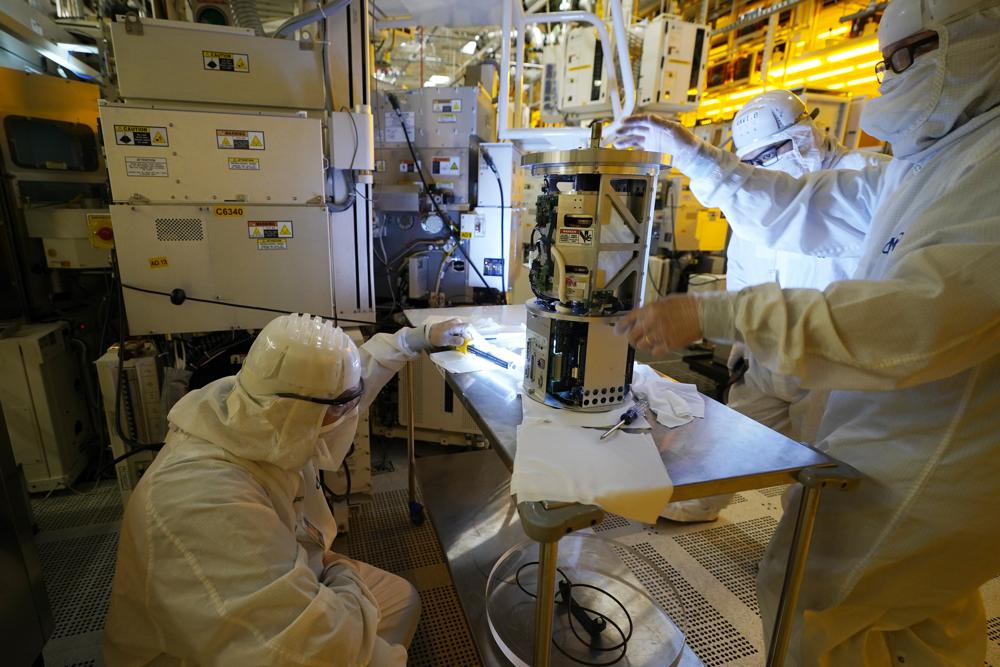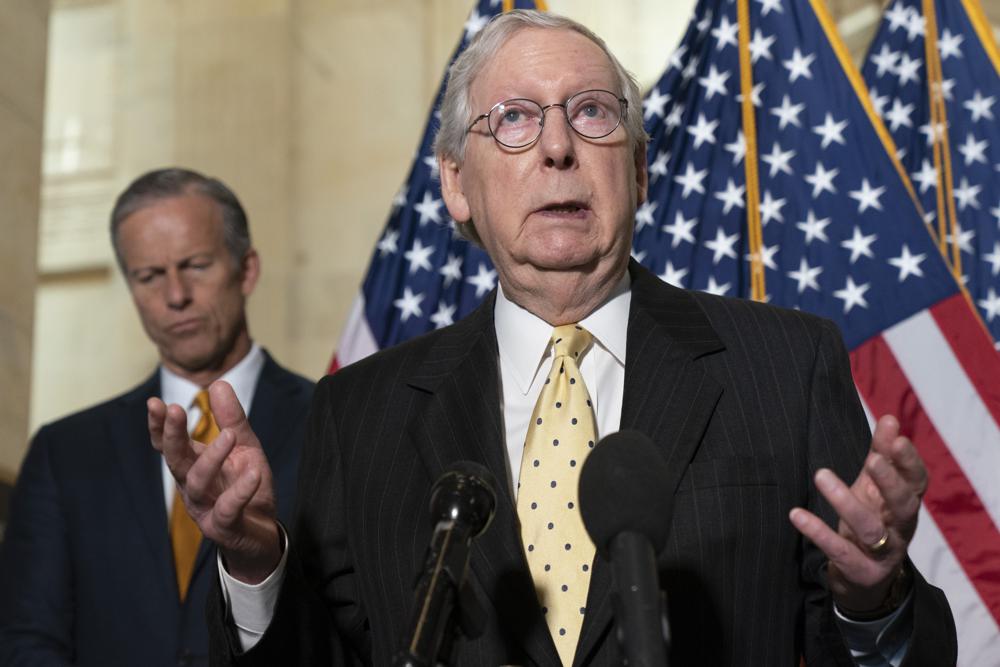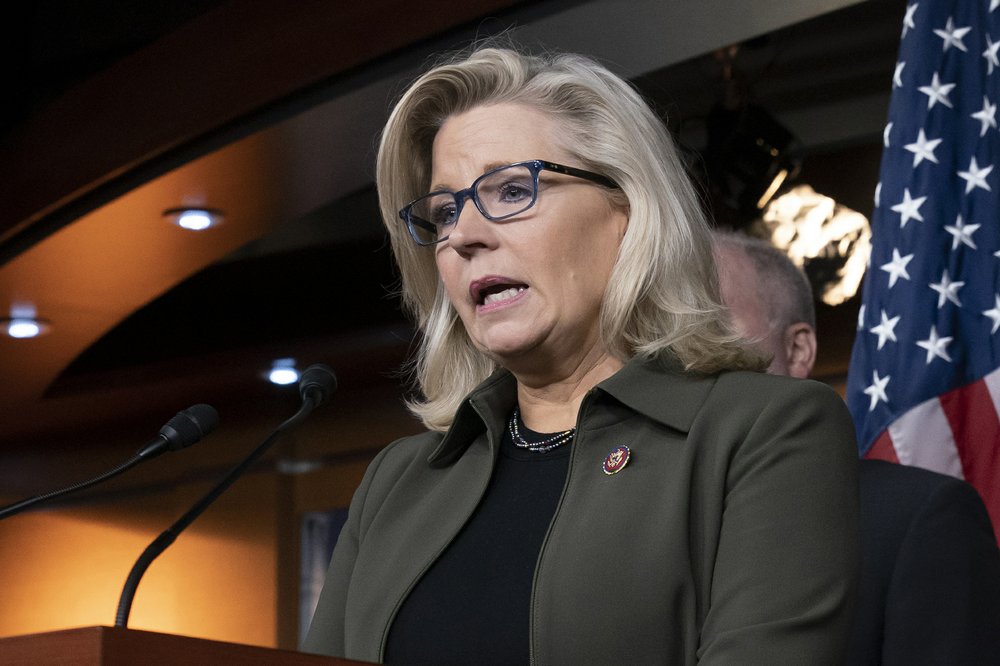Senate passes bill to boost computer chip production in U.S.

A bill designed to encourage more semiconductor companies to build chip plants in the United States passed the Senate on Wednesday as lawmakers raced to finish work on a key priority of the Biden administration. The $280 billion measure, which awaits a House vote, includes federal grants and tax breaks for companies that construct their chip facilities in the U.S. The legislation also directs Congress to significantly increase spending on high-tech research programs that lawmakers say will help the country stay economically competitive in the decades ahead. Senate passage came by a 64-33 vote. The House vote is expected later this week as lawmakers try to wrap up business before returning to their home states and districts in August. House Speaker Nancy Pelosi, D-Calif., has said she is confident there is enough GOP support to overcome potential defections from Democrats who view the subsidy effort to boost semiconductor companies as a misplaced priority. Seventeen Republicans voted for the measure. Sen. Bernie Sanders, I-Vt., broke ranks with Democrats in voting against the bill. Proponents of the legislation say other countries are spending billions of dollars to lure chipmakers. Backers say the U.S. must do the same or risk losing a secure supply of the semiconductors that power automobiles, computers, appliances, and some of the military’s most advanced weapons systems. Senate Majority Leader Chuck Schumer, D-N.Y., said the bill represented one of the nation’s largest investments in science and manufacturing in decades and that with the Senate’s approval, “we say that America’s best years are yet to come.” Opponents have been critical of the bill’s price tag. It is projected to increase federal deficits by about $79 billion over ten years. President Joe Biden said the bill would create jobs and lower costs on a wide range of products from cars to dishwashers. “For decades, some ‘experts’ said we needed to give up on manufacturing in America. I never believed that. Manufacturing jobs are back,” Biden said. “Thanks to this bill, we are going to have even more of them. The House should promptly pass it and send this bill to my desk.” The bill has been in the works for years, starting with efforts by Schumer and Sen. Todd Young, R-Ind., to increase the government’s investment in high-tech research and development. While the bill has taken several twists and turns, one constant theme that lawmakers repeatedly emphasized during Wednesday’s debate was the need to keep up with China’s massive investments in cutting-edge technology. China’s government is planning on “winning the (artificial intelligence) race, winning future wars and winning the future,” Young said. “And the truth is, if we’re being honest with ourselves, Beijing is well on its way to accomplishing these goals.” Sen. Roger Wicker, R-Miss., said: “Regrettably, we are not in the driver’s seat on a range of important technologies. China is.” Congress, he said, now has “a chance to move us back in the right direction and put America back into a place to win the game.” The bill provides more than $52 billion in grants and other incentives for the semiconductor industry, as well as a 25% tax credit for those companies that invest in chip plants in the U.S. It calls for increased spending on various research programs that would total about $200 billion over ten years, though Congress will have to follow through by approving that money in future spending bills. Despite years of work, the bill’s future did not look so promising about a month ago. That’s when Senate Republican leader Mitch McConnell tweeted that there would be no chips legislation as long as Democrats pursued a party-line package of energy and economic initiatives. GOP support is critical in the Senate to get the 60 votes needed to overcome a filibuster. But when Sen. Joe Manchin of West Virginia quashed the idea of imposing higher taxes on the rich and corporations, key Republicans said that was an opening to go forward on semiconductors. Meanwhile, the Biden administration pushed to get a bill passed before the August recess, even if meant considerably narrowing the focus to just the $52 billion in semiconductor incentives. Commerce Secretary Gina Raimondo told lawmakers behind the scenes and publicly that semiconductor companies were making plans on how to meet the increased demand for chips. She said the growth in the industry would move forward with or without the United States and if lawmakers didn’t act quite soon, those companies would simply choose to build in other countries offering significant financial incentives. Schumer said that after McConnell’s statement, he called the CEOs of chipmakers and companies such as General Motors and Ford and reached out to “unlikely allies” like the U.S. Chamber of Commerce and the Business Roundtable. He urged them to reach out to Republican senators about the importance of the bill. “And they changed things,” Schumer told The Associated Press. “They really, for the first time, industry really helped a good government program.” The House could take up the bill as soon as Thursday. While most Republicans are expected to oppose it, some of the ranking Republicans on committees dealing with national security — Reps. Michael McCaul of Texas, Michael Turner of Ohio, and John Katko of New York — support the measure. So do many of the Republicans on a bipartisan group called the Problem Solvers Caucus, which is made up of moderates from both parties. Republished with the permission of The Associated Press.
House votes to create panel to probe Jan. 6 insurrection

The House voted Wednesday to create an independent commission on the deadly Jan. 6 insurrection at the U.S. Capitol, sending the legislation to an uncertain future in the Senate as Republicans increasingly line up against the bipartisan investigation and align themselves with former President Donald Trump. Democrats say an independent investigation is crucial to reckoning what happened that day when a violent mob of Trump’s supporters smashed into the Capitol to try and overturn President Joe Biden’s victory. Modeled after the investigation into the Sept. 11, 2001, attacks, the legislation would establish an independent, 10-member commission that would make recommendations by the end of the year for securing the Capitol and preventing another insurrection. It passed the House 252-175. But top Republicans in Congress are working to stop it. Senate Republican leader Mitch McConnell said Wednesday morning that he will oppose the legislation, joining with House GOP leader Kevin McCarthy, who came out against it Tuesday. Both men claimed the bill was partisan, even though membership of the proposed commission would be evenly split between the parties. The January insurrection has become an increasingly fraught topic for Republicans, with a growing number in the party downplaying the severity of the worst attack on the Capitol in more than 200 years. While most Republicans voted against forming the commission, only a few spoke on the floor against it. And a handful of Republicans who backed the commission spoke forcefully. “This is about facts — it’s not partisan politics,” said New York Rep. John Katko, the top Republican on the House Homeland Security Committee who negotiated the legislation with Democrats. He said, “the American people and the Capitol Police deserve answers, and action as soon as possible to ensure that nothing like this ever happens again.” Rep. Fred Upton, R-Mich., said that Jan. 6 “is going to haunt this institution for a long, long time” and that a commission is necessary to find the truth about what happened. He recalled that he “heard the shouts, saw the flash-bangs, smelled the gas on that sorry day.” Democrats grew angry as some Republicans suggested the commission was only intended to smear Trump. Several shared their own memories of the insurrection, when rioters brutally beat police, broke in through windows and doors, and sent lawmakers running. Four of the rioters died, including a woman who was shot and killed by police as she tried to break into the House chamber. A Capitol Police officer collapsed and died after engaging with the protesters, and two officers took their own lives in the days after. “We have people scaling the Capitol, hitting the Capitol Police with lead pipes across the head, and we can’t get bipartisanship? What else has to happen in this country?” shouted Rep. Tim Ryan, D-Ohio, on the floor just before the vote. He said the GOP opposition is “a slap in the face to every rank and file cop in the United States.” The vote was yet another test of Republican loyalty to Trump, whose grip on the party remains strong despite his election defeat. House Republicans booted Wyoming Rep. Liz Cheney from their leadership last week for her criticism of Trump’s false claims, installing a Trump loyalist in her place. Cheney, in turn, suggested to ABC News that a commission could subpoena McCarthy because he spoke to Trump during the insurrection. House Speaker Nancy Pelosi, D-Calif., called McCarthy’s opposition to the commission “cowardice.” She released a February letter from the GOP leader in which he asked for an even split of Democrats and Republican commissioners, equal subpoena power, and no predetermined findings or conclusions. The bipartisan legislation accommodates all three of those requests, she said. “Leader McCarthy won’t take yes for an answer,” she said. In the Senate, McConnell’s announcement dimmed the prospects for passage. But Senate Majority Leader Chuck Schumer, D-N.Y., vowed to force a vote on the bill, charging that Republicans are “caving” to Trump. Schumer said that Republicans are trying to “sabotage the commission” and are “drunk” off Trump’s baseless claim that the election was stolen from him. That false assertion, repeated by the mob as the rioters broke into the Capitol, has been rebuked by numerous courts, bipartisan election officials across the country, and Trump’s own attorney general. Trump released a statement Tuesday night urging Republicans to oppose the commission, calling it a “Democrat trap.” Like in the House, some Senate Republicans have suggested they will support the legislation. Utah Sen. Mitt Romney said Tuesday that given the violent attack, “we should understand what mistakes were made and how we could prevent them from happening again.” Louisiana Sen. Bill Cassidy said he doesn’t agree with McConnell that the bill is slanted toward Democrats and “I’m inclined to support it.” Maine Sen. Susan Collins, a Republican, said that she supports the idea of a commission but that the House bill would need adjustments. Others have pushed their colleagues to oppose the commission. Missouri Sen. Roy Blunt, the top Republican on the Senate Rules Committee, is working on a report with his Democratic colleagues that will include recommendations for security upgrades. He said an independent investigation would take too long and “frankly, I don’t think there are that many gaps to be filled in on what happened on Jan. 6, as it relates to building security.” South Dakota Sen. John Thune, the No. 2 Republican in the Senate, cited concern in the caucus that the investigation could be “weaponized politically” in the 2022 election cycle. “I want our midterm message to be about the kinds of issues that the American people are dealing with,” Thune said. “It’s jobs and wages and the economy, national security, safe streets, strong borders and those types of issues, and not relitigating the 2020 election.” Separately Wednesday, aides to Rep. Jamie Raskin, D-Md., circulated a letter they said was from a group of around 40-50 anonymous U.S. Capitol Police officers who had been speaking with the congressman. “It is inconceivable that some of the Members we
Additional GOP leader backs Donald Trump impeachment as tide grows

Republican opposition to impeaching President Donald Trump began crumbling at the party’s upper echelons on Tuesday as the No. 3 House GOP leader said she would vote to impeach Trump. “There has never been a greater betrayal by a President of the United States of his office and his oath to the Constitution,” Rep. Liz Cheney, R-Wyo., said in a statement that, while not unexpected, shook Congress as lawmakers prepared for a Wednesday House vote. With Democrats commanding that chamber, a vote impeaching Trump for an unprecedented second time seemed certain. More ominously for a president clinging to his final week in office, The New York Times reported that influential Senate Majority Leader Mitch McConnell thinks Trump committed an impeachable offense and is glad Democrats are moving against him. Citing unidentified people familiar with the influential Kentucky Republican’s thinking, the Times reported McConnell believes moving against Trump will help the GOP forge a future independent of the divisive, chaotic president. McConnell thinks Trump’s behavior before last week’s assault on the Capitol by fuming Trump supporters cost Republicans their Senate majority in two Georgia runoff elections, the newspaper reported. That’s a sentiment shared by many Republicans about Trump, who rather than focusing on bolstering Georgia’s two sitting GOP senators spent the last weeks of their campaign reciting his false narrative that his own reelection was ruined by Democratic election fraud. McConnell is said to be angry at the president over the insurrection at the Capitol and the twin defeats in Georgia that cost the party its Senate majority, according to a Republican granted anonymity to discuss the situation. Cheney, daughter of former Vice President Dick Cheney, has run afoul of Trump and far-right Republicans over the years on issues like wearing a facemask and withdrawing troops from Syria. She’s respected by mainstream conservatives and is one of the GOP’s few House female stars. “Good for her for honoring her oath of office,” House Speaker Nancy Pelosi, D-Calif., told reporters when asked about Cheney’s decision. “Would that more Republicans would honor their oaths of office.” Lawmakers’ oath includes a vow to defend the Constitution “against all enemies, foreign and domestic.” Reps. Adam Kinzinger, R-Ill., an Air Force veteran, and John Katko, R-N.Y., a former federal prosecutor, became the first rank-and-file GOP lawmakers to say they would vote to impeach Trump. Later joining the GOP faction was Rep. Fred Upton, R-Mich. The House will vote on an impeachment article charging Trump with incitement of insurrection over his goading of a pro-Trump crowd that poured past police lines into the Capitol last Wednesday, disrupting lawmakers’ ceremonial counting of the electoral votes that sealed Trump’s defeat, leaving five dead and widespread damage. “There is no doubt in my mind that the President of the United States broke his oath of office and incited this insurrection,” Kinzinger said in a statement about Trump, whom he’s repeatedly criticized over the years. In a statement, Upton said: “Congress must hold President Trump to account and send a clear message that our country cannot and will not tolerate any effort by any President to impede the peaceful transfer of power from one President to the next.” “To allow the president of the United States to incite this attack without consequence is a direct threat to the future of our democracy,” Katko said in a statement. “For that reason, I cannot sit by without taking action” and backing impeachment. In remarks to his supporters outside the White House before they streamed to the Capitol, Trump told them “this is the time for strength,” adding, “We got to get rid of the weak Congress people,” describing them as “the Liz Cheneys of the world.” Republicans have said they expected perhaps 10 House GOP lawmakers to break ranks and vote with Democrats to impeach Trump, and a clear majority of Republicans seem likely to stand by him. But Trump may not have helped himself Tuesday. In his first public appearance since the attack on the Capitol, he took no responsibility for his role in egging on his supporters and added falsely, “People thought that what I said was totally appropriate.” House Minority Leader Kevin McCarthy, R-Calif., has told his colleagues that he believes impeaching Trump would be wrong but has not ruled out censuring him or taking other steps. House GOP leaders say they won’t press their colleagues on how they will vote Wednesday. In its story, the Times did not say how McConnell would vote in a Senate trial to convict Trump. Such a finding would usually result in a president’s removal from office, but in this case it seems unlikely a trial could be held and concluded before Jan. 20, when Democrat Joe Biden will be inaugurated to replace him. McConnell has been the engine that has driven Trump’s Supreme Court appointees and scores of other federal judicial nominees through the chamber. While seldom criticizing Trump, he often resorts to silence when pressed by reporters on some of Trump’s more outrageous statements and their relationship has never seemed warm. One White House official said McConnell and Trump last spoke in in mid-December. Republished with the permission of the Associated Press.


